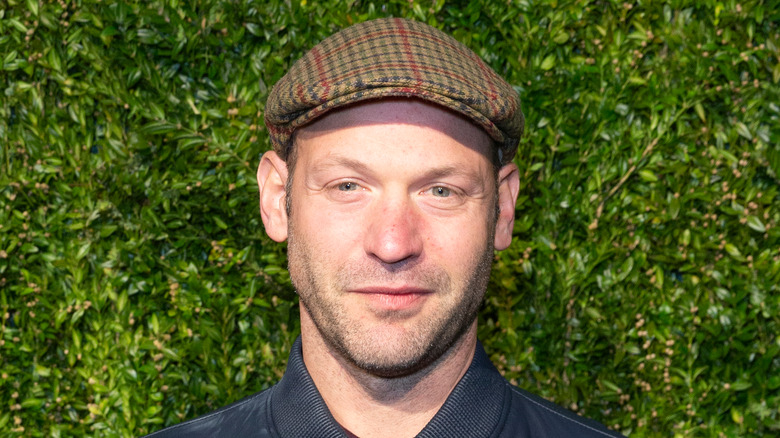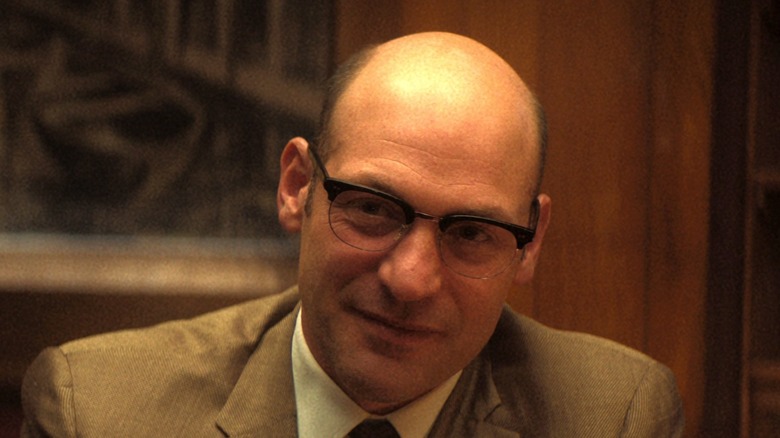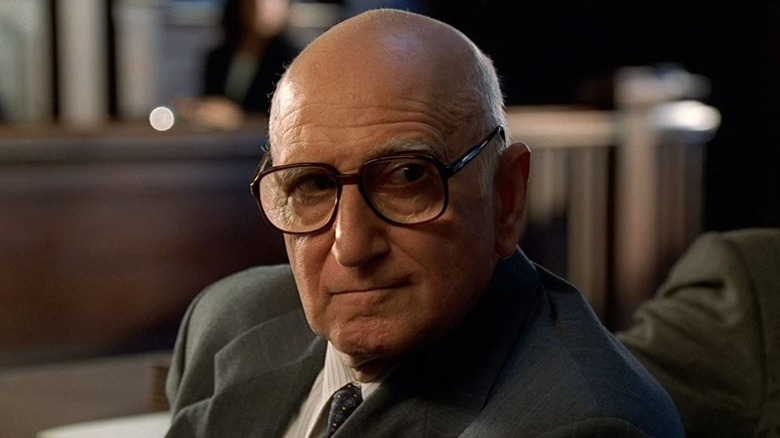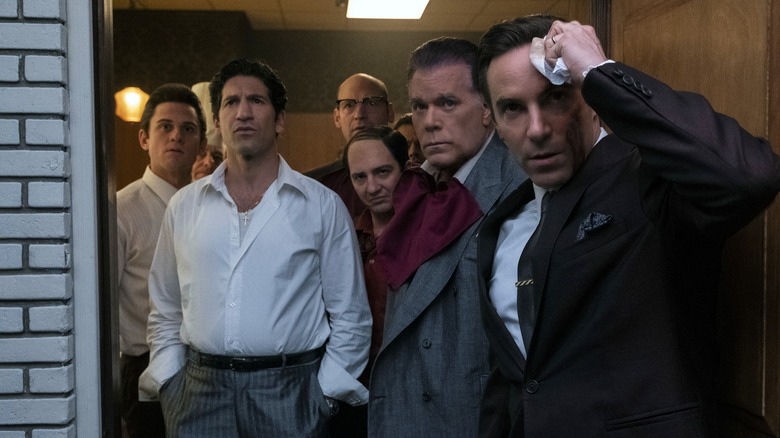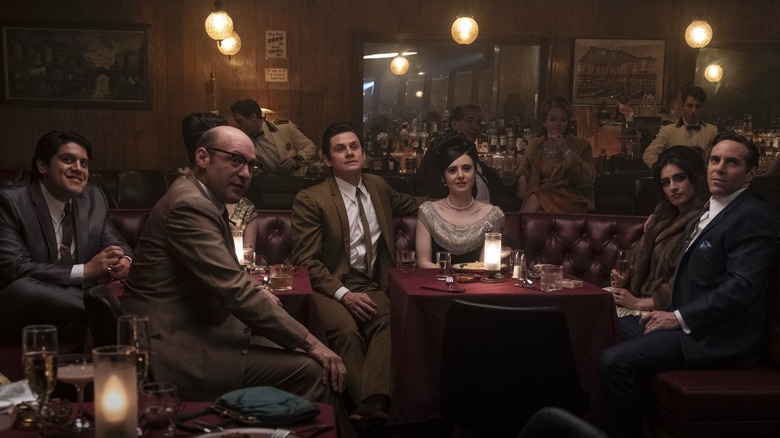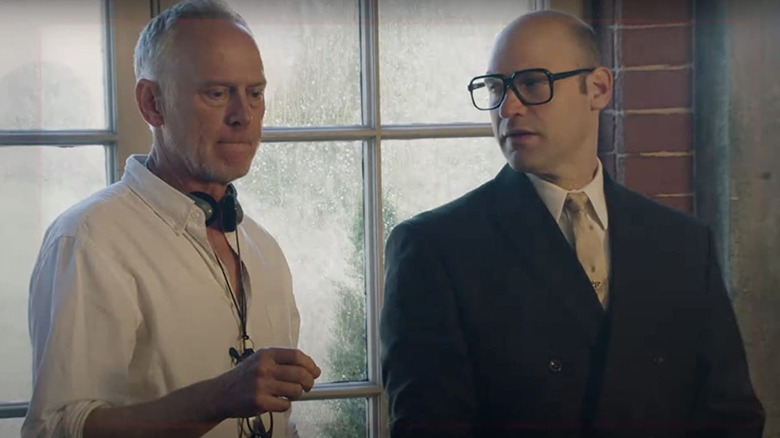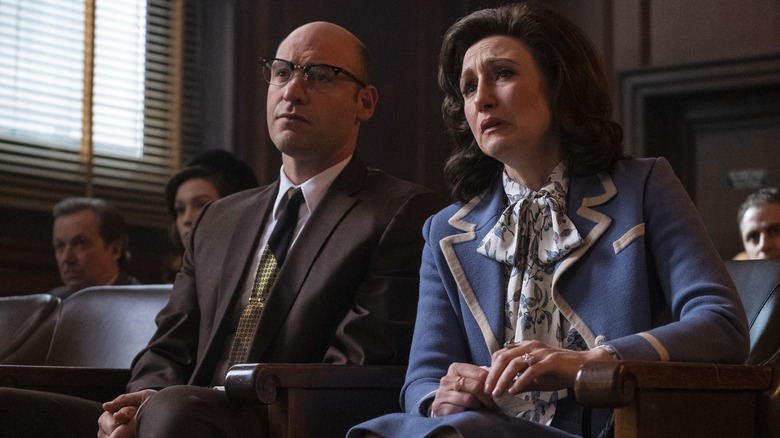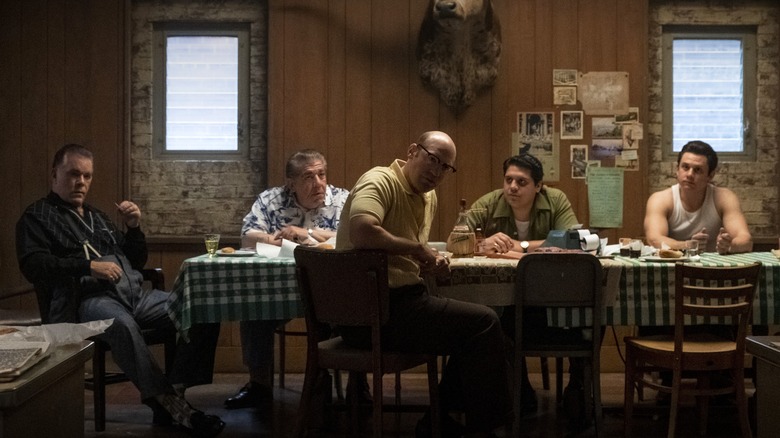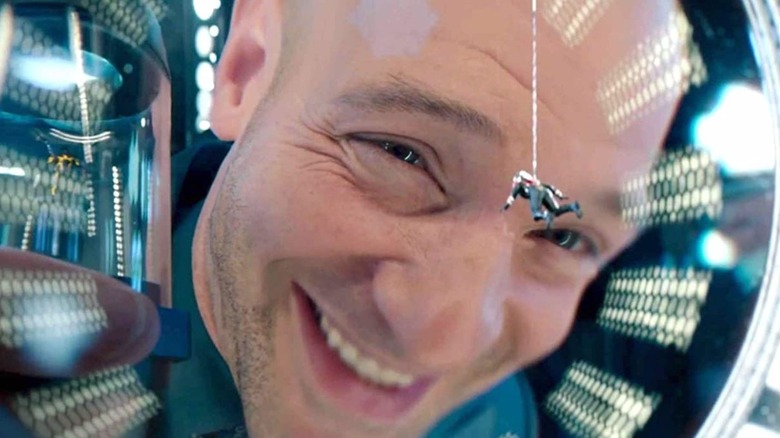The Many Saints Of Newark's Corey Stoll Details The Making Of Uncle Junior In The Sopranos Prequel - Exclusive Interview
After nearly two decades in show business and more than 65 roles in film and television, actor Corey Stoll is finally starring in a movie he was made for, playing Corrado John Soprano Jr. — aka "Uncle Junior" — in the hotly anticipated mob drama "The Many Saints of Newark."
The film, of course, is the long-awaited prequel story to the classic series "The Sopranos," which redefined the mob genre over six seasons on HBO from 1999 to 2007. The series chronicled the harrowing plight of New Jersey mob boss Tony Soprano (James Gandolfini) as he confronted, among other things, his intense relationship with Uncle Junior (Dominic Chianese) — the older brother of Tony's late father, Johnny Boy Soprano.
Opening in theaters Friday, October 1, as well as streaming exclusively on HBO Max, "The Many Saints of Newark" is set in the late 1960s and early 1970s as it recounts the formative years of Tony Soprano (Michael Gandolfini, stepping into the role made famous by his late father, James Gandolfini). Stoll plays a younger Uncle Junior, seen as the DiMeo crime family adjusts to the changing landscape of organized crime in New Jersey following the Newark race riots. The film is rooted in the harrowing plight of Richard "Dickie" Moltisanti (Alessandro Nivola), who rises in the ranks of the DiMeo crime family as he follows in the footsteps of his volatile father, "Hollywood Dick" Moltisanti (Ray Liotta). Also woven within the story is Dickie mentoring the young and impressionable Tony.
While "The Many Saints of Newark" is one of Stoll's most high-profile roles to date, the film is hardly his first trip the big screen. Stoll has been winning acclaim and respect from his peers for his work in such TV series as "House of Cards," "Law & Order: LA," "The Strain," and "Billions," as well as his turns in such hit films as "Salt," "The Bourne Legacy," "Non-Stop," "Black Mass," and "First Man."
In an exclusive interview with Looper, Stoll recounted his love for "The Sopranos" and the road to "The Many Saints of Newark." Stoll also revealed the steep challenge of playing the younger version of Uncle Junior, and the remarkable similarities between the character and his villainous Darren Cross-slash-Yellowjacket in the Marvel Cinematic Universe blockbuster "Ant-Man."
Stoll was eager to be part of the Sopranos franchise
Your career was already on the move when "The Sopranos" started, so I'm wondering, were you harboring this secret desire to somehow become a part of the series then?
Yeah. I mean, I got out of acting school in 2003, and I don't know. I remember, when did the show finish? In like, 2006?
In 2007.
So, yeah. There were a few years where I was waiting for that call to get an audition and never did. And I would've taken a very small part just to be on that set, just to be a part of that show. And that never happened, and so I said, "Oh. I guess I missed that opportunity." And then, I didn't even know this project was happening and got the call ... I would've taken a really small part just to be a part of it. But to play such a great, hilarious, memorable character, I felt really, really lucky.
You would've taken a part even if you got whacked within 30 seconds, I would imagine.
Exactly, exactly. And in this one, I know they can't whack me!
Figuring out Uncle Junior
Obviously Junior Soprano is a crucial role and of course, you're playing a different iteration of the character. Fans should know going in that yes, you have some of Uncle Junior's attributes, but he's not quite the Uncle Junior from "The Sopranos."
Yeah. I mean, and I think that was a lot of the fun and the challenge of the role ... to sort of figure out how much of his personality and his behavior was just being an old man, where he was when the series began, and how much is inherent to his personality. I think one of the things that's really fun in this movie is you can see some of those early, really traumatic resentments that he starts to harbor, and obviously to violent ends.
I saw an interesting interview with Michael Gandolfini, where he recounted how David and Alan Taylor said to him, "You know what, you're not quite there yet. You're not quite the Tony Soprano that we see in the series. You need to pull it back." Did David or Allen have to remind you to "pull it back" or was that already ingrained in your mind when you were on the set?
No, it was a pretty light touch that those guys took with me, I think. You know, I threw myself into research, which just meant watching the show again, and listening to clips of Dominic Chianese as Junior telling jokes. I found his joke-telling to be a really great way into his patterns and cadences. And just playing these scenes as written. I mean, when you have writing like David Chase's, all you really have to do is say the words ... He does the work for you.
All in the family
The mob genre has always been fascinating to me. I think I love it so much because of the deep family ties, the family dynamic involved in a lot of mob movies. Do you feel the same way? I mean, I would imagine you wouldn't be interested in a series like "The Sopranos" or a film like "Many Saints" if you didn't have a love for the mob movie genre.
Yeah. And I think with "The Sopranos" and other movies like it, what "The Sopranos" really perfected was how these different families interact with each other, and how you can have these violent reactions to your real family, and deep, emotional feelings for your crime family — and how it all sort of gets mixed up. I thought that's so rich, and the stakes are obviously so high because these are murderers ... and people do die.
Maintaining the Soprano sense of humor
Murderers and people dying ... that's the difficult part about enjoying shows and movies like this. The characters are antiheroes in "The Sopranos," as they are in "The Many Saints of Newark." People root for them, even though they show psychotic tendencies. But I think what I love about this and probably something you realized right away on the set, was that "The Many Saints of Newark" maintains the sense of humor the show had.
Oh yeah, absolutely. I mean, I didn't quite see it on the page. And then we had our first table read, which was a really exciting moment because it was the first. And for me that was probably the most nervous moment because I hadn't spoken these words out loud — and I just, I didn't know where I was in terms of being able to inhabit the character. But we were just laughing hysterically the whole time.
I think it's something that some people forget about the show. I mean, there's so much I remember. I think some of the people on the internet were complaining during the original show, "Less yacking, more whacking." But it's the yacking, that's what makes the show so brilliant, and so approachable for everybody — for the completist fanatic and for the person just watching it for the first time.
Creating a whole new canvas
Once you got to the set, were there any scenes in particular that were maybe a little bit more nerve-racking, where you said to yourself, "I don't really want to screw this up for Dominic's sake" — or David or Allen Taylor's, for that matter?
No, I don't think so. I think once we started working — and this wasn't a series, this is a major motion picture with a big budget, incredible costumes, and sets. And you'd step onto set and you were there. You were there to add your little part to this really huge canvas. And yeah, there didn't seem to be room for that, which was kind of great. There was too much work to do. And it's not until we're done now, sharing the work with the rest of the world, that maybe some nervousness can kick in.
Bits of Sopranos foreshadowing
It's the early days of Junior Soprano, like the other characters in the film, so fans are obviously going to be looking for bits of foreshadowing with the character. Were there subtle things that you layered in that you're hoping only super fans pick up on?
Well, they've got to be super fans to be able to pick them up. [Laughs] I'm not going to highlight those for them.
But you did indeed layer things in?
Well, I mean, I'm sure I did. I don't know how conscious it was. I was steeped in this character. I paid as close attention to Dominic Chianese's performance as anybody has. My third time watching through the series, I was just laser focused onto him. I was soaking in it. There's a lot that just sort of happens by osmosis and I mean, that's what you hope to do. I'm not the kind of actor who hopes to come up with everything I'm going to do, and then come to set and just do it. That's boring to me, and also, I don't think I'm really capable of that. What I try to do is to know as much about this character as possible, and then show up and try to be as present as possible on this set. And so, I think hopefully little idiosyncratic behavioral things come through, but without hopefully being sort of forced.
Stoll hopes to explore Uncle Junior even further
The great part about this movie is there are decades between when "The Many Saints of Newark" ends and "The Sopranos" begins. It allows us to imagine so many more prequel stories. Where do you hope to see Junior Soprano go from here, if there is another film?
Well, without giving spoilers away about the end of this movie, even though we know what my character did, somebody else has to get blamed for it — and so, we need to go to war to avenge that, and I think that's a whole other world. And what happens to Johnny Boy? We know that he dies, and I would really love to see the conclusion of that relationship, because I think Johnny and Corrado's brotherhood is very fraught.
In the original series, Junior speaks nothing but good things about his younger brother. But there's a tension there in that, since Junior is supposed to be the leader — he's the older brother, and he's taking orders from his younger brother — No matter how much he sort of worships him ... and that's the way he really speaks of him worshipfully in the series. There's got to be a lot of resentment there. So, how does that relationship conclude? I think that would be really fun to play, and it would be just fun to do more stuff with Jon Bernthal. I think he is just fantastic.
The similarities between Uncle Junior and Ant-Man's Darren Cross
I loved your performance in "Ant-Man." Of course, Yellowjacket — Darren Cross — suffered a gruesome fate and was sent to the Quantum Realm after the suit basically imploded. But now it seems like the MCU is opening up to this idea of the multiverse. If the opportunity came up to play a different version of Yellowjacket, would you jump into the suit again? And what would it take for that jump to happen?
Yes, I would. I absolutely would. And it would take some great writing and people willing to play. So, yeah. I love those movies, and I had so much fun doing the first one. There's so much freedom in these crazy characters, and they're actually ... I think Junior and Darren Cross are not entirely dissimilar.
That's interesting. Why do you say that?
Well I mean, I don't want to get too deep about it, but they're both smart and ruthless, and believe that they should get more respect than they do. And it's that resentment that leads to the violence, not necessarily a hunger for power itself, but a hunger for respect and affection from father figures and brother figures in their lives.
Also starring Vera Farmiga, Leslie Odom Jr., Michela De Rossi, John Magaro, Samson Moeakiola, and Billy Magnussen, "The Many Saints of Newark" opens in theaters and streams exclusively on HBO Max Friday, October 1.
